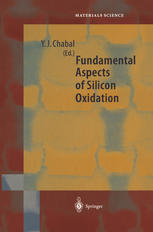

Most ebook files are in PDF format, so you can easily read them using various software such as Foxit Reader or directly on the Google Chrome browser.
Some ebook files are released by publishers in other formats such as .awz, .mobi, .epub, .fb2, etc. You may need to install specific software to read these formats on mobile/PC, such as Calibre.
Please read the tutorial at this link: https://ebookbell.com/faq
We offer FREE conversion to the popular formats you request; however, this may take some time. Therefore, right after payment, please email us, and we will try to provide the service as quickly as possible.
For some exceptional file formats or broken links (if any), please refrain from opening any disputes. Instead, email us first, and we will try to assist within a maximum of 6 hours.
EbookBell Team

4.0
16 reviewsThis book presents fundamental experimental and theoretical developments relating to silicon oxidation for ultra-thin gate oxide formation. Starting with elementary processes taking place during wet chemical cleans prior to oxidation, the focus is then placed on the incorporation of oxygen into the silicon crystal for H-passivated, clean and oxidized silicon surfaces, including oxygen diffusion and defect formation. Experimental methods include scanning tunneling microscopy, x-ray photoelectron and infrared absorption spectroscopies, ion scattering and transmission electron microscopy. Most of the theoretical contributions are based on first-principles calculations, ranging from cluster calculations to supercell and slab calculations. Phenomenological modeling of oxidation is also discussed. The material presented here will enable the reader to gain a deeper understanding of silicon oxidation and ultra-thin oxide formation (and the processes that affect the morphology of silicon oxides).